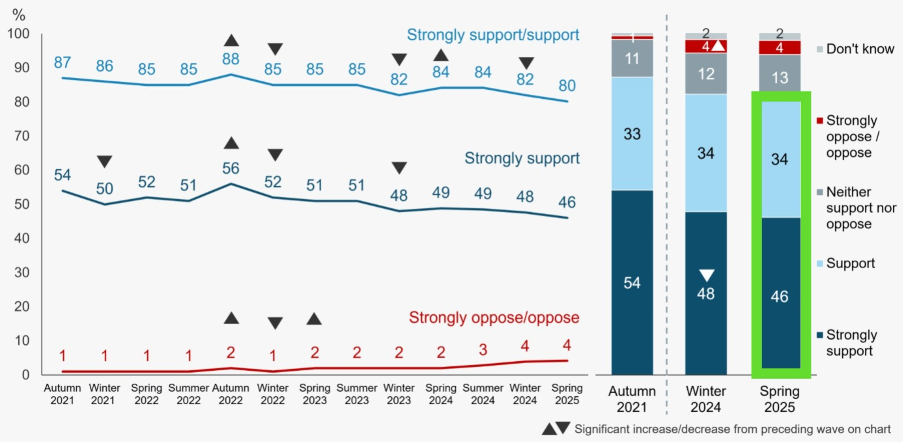The Public Says “Yes!” to Clean Energy
by
Councillor Oliver Patrick
Liberal Democrat Councillor and Vice Chair of Planning Committee South, Somerset Council
As the UK works to meet its climate targets and reduce reliance on fossil fuels, communities are increasingly being asked to consider renewable energy developments near where they live. These include solar farms, wind turbines, battery storage, and other clean energy infrastructure.
However, whilst public support for renewables remains high, projects are often delayed or blocked at the local level. To move forward, we need better public engagement, stronger local conversations, and, yes, direct benefits for communities.
Widespread Support … Local Resistance
Public backing for renewable energy is overwhelmingly strong. According to the latest release from the DESNZ public attitudes tracker, 80% of people said they support renewables, with a whopping 86% saying they support solar farms. With only around 4% strongly opposed to renewables, it’s clear that the public says “yes!” to clean energy.
Despite this, local projects often run into opposition around visual impact, noise, disruption, or distrust of developers, leading to costly delays or cancellations. The attitudes tracker backs this up. When asked for views on solar farms being built in their local area, support halved to 46% in favour (still greatly outnumbering those opposing, which stands currently at 14% according to the latest opinion polling).
Furthermore, pay close attention to the public attitudes tracker and you’ll see that support has dipped and opposition has risen slightly in recent years (not by much - just a couple of % either way).
All of this provides a salient reminder…
Do Not Take Public Support for Granted!
To keep the public on side we need to be ever-mindful of how renewable energy projects are planned and communicated to locals. Success depends on early, honest, and meaningful public engagement with tangible direct benefits to affected communities.
Those of us taking an unhealthy interest in these matters will already know that DESNZ has published a White Paper seeking views on making Community Benefit Funds mandatory (currently there is no legislation requiring these).
As a Councillor I’ve seen a number of large solar farms proposed in my area. This creates tension in a community - there’s no denying that. Like housing, the number of objectors to a new development will often be more vocal and more persistent than those in support.
Developers, in my experience, who focus on direct benefits for the community come out of these situations well. That’s because benefit sharing is critical. If a community is hosting a solar or wind project, it should also share in the rewards. This might include discounted energy, community benefit funds, or opportunities to invest directly. When residents see a clear return, support grows.
The Role of Developers
Developers are central to the clean energy transition. How developers approach local engagement can make or break a project. The best developers do more than meet the minimum requirements, they actively build relationships with local communities and treat residents as partners, not obstacles to be overcome.
Good developers…
Share clear information early and respond to concerns honestly
Adapt proposals based on community feedback
Offer tangible local benefits such as funding for public spaces or discounted electricity
Work with local groups to ensure lasting community impact
By taking this approach, developers can reduce conflict, improve outcomes, and build a reputation for trustworthiness and fairness.
A Social Transition Not Just a Technical One
Switching to clean energy is not just a matter of engineering, it is about people. If the transition to net zero is to succeed then we can’t assume that the wave of public support will remain high. We can’t assume that favourable DESNZ attitudes trackers mean there is local support for a project.
When residents are informed, involved, and respected, they are far more likely to say “yes!” By providing genuine engagement early in the process, we can move from “not in my backyard” to “yes in our community” (“YIOC?!” - Editor) all the while helping to deliver a cleaner, greener future for everyone.

